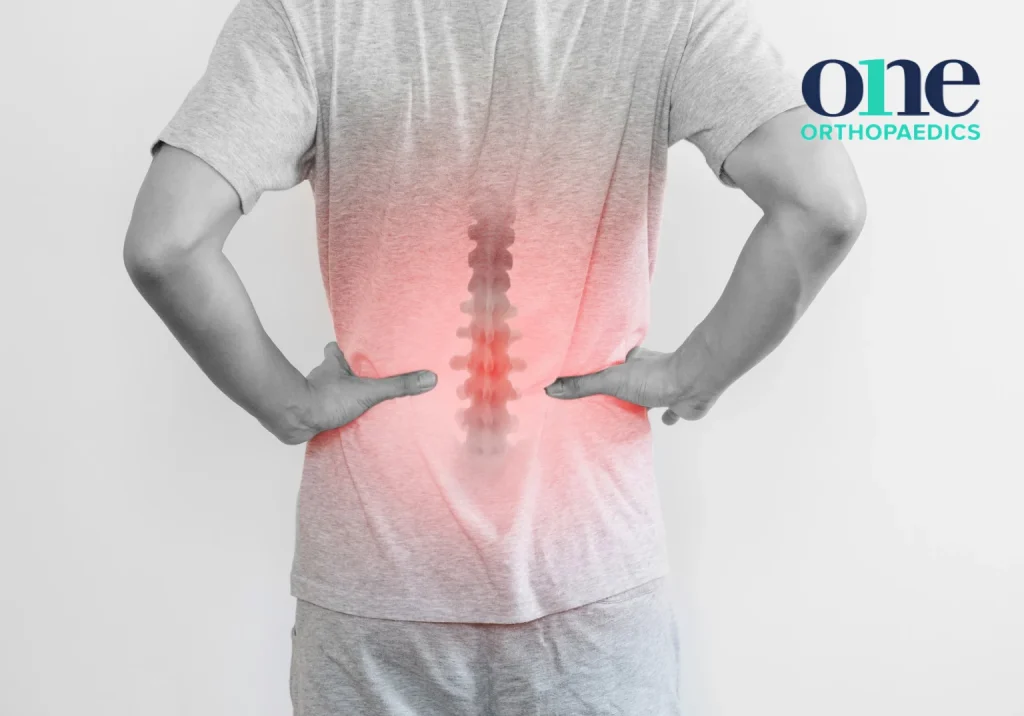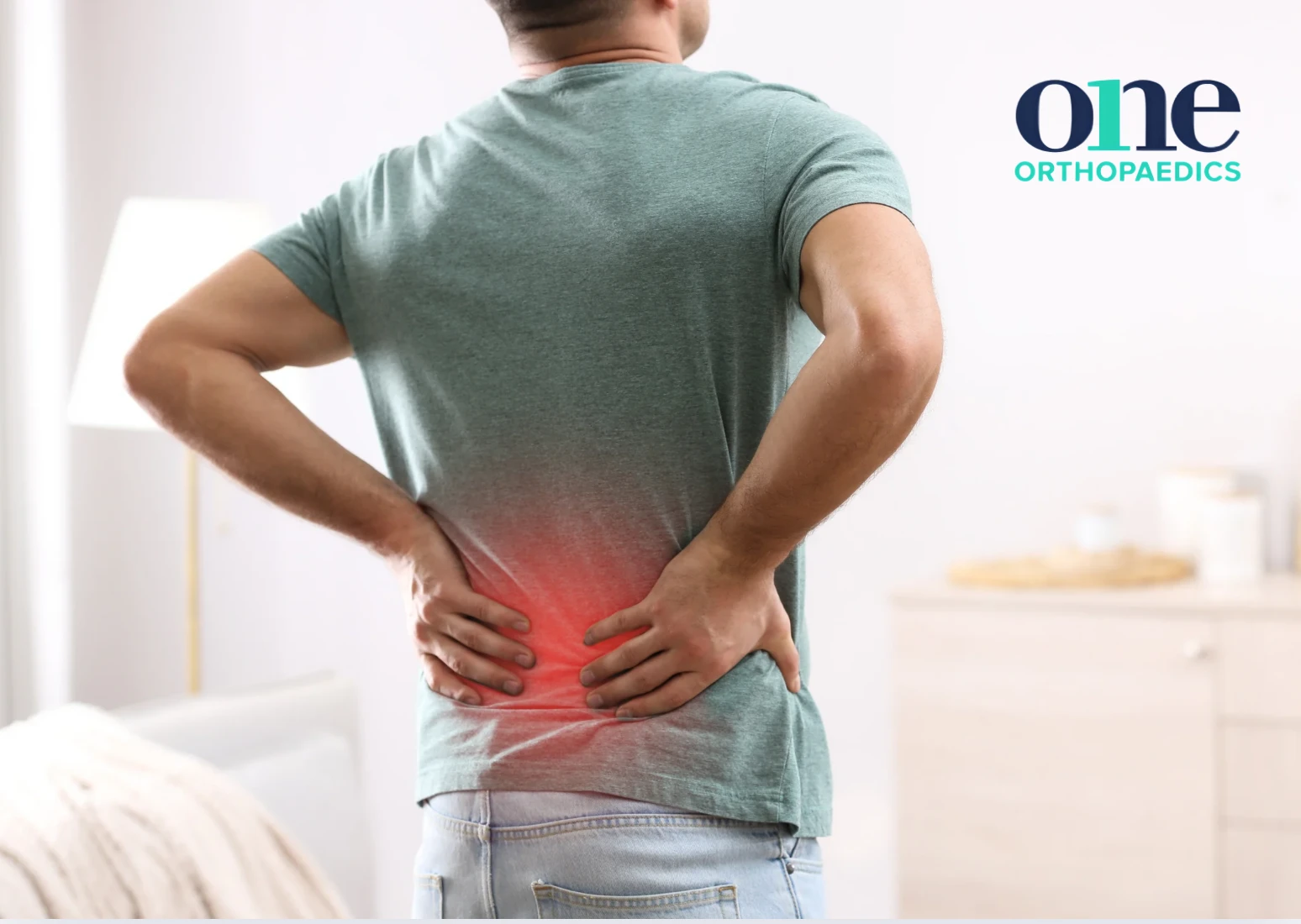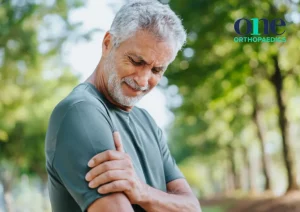Common Types of Back Injuries from a Car Accident
A back injury after a car accident can vary in severity, from mild discomfort to serious, life-altering conditions. The sudden impact and force involved in collisions often cause trauma to the muscles, ligaments, discs, or vertebrae of the spine. Whether you’re dealing with ongoing pain or a newly diagnosed condition, it’s essential to understand the most common types of back injuries and their symptoms.
For more information on back pain, visit the One Orthopaedics Back Injury Page.
Whiplash and Upper Back Pain
Although often associated with the neck, whiplash can also cause pain and stiffness in the upper back. It occurs when the head and neck are jerked suddenly, usually from a rear-end collision, leading to overstretched ligaments and soft tissue injuries. People in Surrey seeking spine injury treatment for whiplash often report aching between the shoulder blades and a reduced range of motion, which may persist for weeks if not properly managed.
Lumbar Strain and Pain in the Lower Spine
A lumbar strain involves overstretching or tearing of muscles and tendons in the lower back. It’s a leading cause of pain in the lower spine following a car crash. Symptoms can include localised tenderness, muscle spasms, and difficulty standing upright. In more severe cases, it may impact your ability to carry out daily tasks or return to work. If you experience persistent pain, it’s important to consult a specialist or access support through the spine pain NHS pathway.
Herniated Discs
A herniated or “slipped” disc is a common result of high-impact trauma, such as a car accident. The force of the crash can cause one of the discs in your spine to bulge or rupture, pressing on nearby nerves. This may lead to radiating pain, numbness, or tingling in the legs, a condition known as sciatica. Timely diagnosis and treatment are vital to prevent long-term nerve damage.
Spinal Fractures
In more severe accidents, vertebral fractures may occur. These injuries can range from minor compression fractures to more complex breaks that affect spinal stability. Symptoms often include intense back pain, numbness, or even loss of bladder or bowel control in serious cases. If you’re in Surrey, urgent spine injury treatment should be sought through A&E or specialist referral pathways.
Causes and Symptoms of Back Pain After a Car Accident
Experiencing back pain after a car accident is alarmingly common, and the causes can range from minor muscle strains to more serious spinal injuries. Whether the pain starts immediately or appears days later, recognising the symptoms early can help guide your recovery and ensure you get the right lower spine pain treatment.
Immediate Pain and Stiffness
In the minutes or hours following an accident, many individuals report sudden, sharp discomfort in the back. This acute pain is typically due to trauma to the soft tissues, joints, or vertebrae. Common symptoms include stiffness, swelling, bruising, and difficulty moving. In some cases, the shock of the accident may temporarily mask more severe underlying injuries.
For patients dealing with spine pain in Surrey, early medical evaluation is critical. Even if you’re able to walk away from the crash, hidden injuries may still be present beneath the surface.
Delayed Onset of Pain
Not all injuries are immediately noticeable. Delayed pain can develop hours or even days after the incident due to inflammation, muscle fatigue, or progressive disc damage. For example, lumbar pain after a car accident might initially feel like mild discomfort, only to intensify as swelling increases or muscles stiffen.
This delayed reaction is particularly common in muscle strain and ligament sprains, where inflammation takes time to peak. If left untreated, these injuries can lead to chronic back problems or limited mobility. Individuals in need of long-term spine pain Surrey services often report that their symptoms were not apparent straight away.
If you’re unsure whether your symptoms warrant professional care, it’s always better to seek a medical assessment. Early intervention can improve outcomes and reduce the risk of complications.
Diagnosing Back Injuries After a Car Accident
Proper diagnosis is essential if you’re experiencing back problems after a car accident. Even minor symptoms could be signs of deeper spinal issues, and without accurate identification, you risk long-term pain or complications. Thankfully, a range of diagnostic tools is available to help uncover the root cause of your discomfort.
Key Diagnostic Methods
Medical professionals often begin with a physical examination, but imaging is typically required to confirm the extent of injury. Common diagnostic methods include:
- X-rays – Ideal for detecting fractures or alignment issues in the spine.
- CT scans – Provide detailed cross-sectional images of bones and soft tissues, helping to identify subtle fractures.
- MRI scans – Crucial for diagnosing herniated discs and soft tissue injuries, such as ligament sprains or muscle tears.
For patients with severe lower spine pain, these investigations are invaluable. They help differentiate between muscle strain and more serious conditions like disc herniation or vertebral fractures.
Why You Should See a Spine Specialist
If you’re dealing with persistent discomfort or functional limitations, it’s essential to consult a Surrey spine specialist. These experts are trained to interpret imaging results accurately and tailor treatment plans to your individual condition. A general practitioner might address pain relief, but only a spine specialist can provide the detailed assessment needed for long-term recovery.
Whether you’re struggling with ongoing discomfort or worrying about back problems after a car accident, seeking expert guidance ensures you receive the most effective care, especially if you’re experiencing severe lower spine pain.
Treatment Options for Back Pain After a Car Accident
Recovering from a spinal injury can be a long journey, but with the right approach, most people see significant improvement. Whether you’re dealing with mild discomfort or more serious spinal trauma, a tailored treatment plan can help restore mobility and reduce pain. There are a range of non-invasive and surgical options available for those seeking back pain relief in Surrey.
Find out more at One Orthopaedics Spine Injury Page.
Conservative Treatment Approaches
For many patients, the first line of treatment involves conservative care. These methods aim to reduce inflammation, restore mobility, and improve strength without the need for surgery.
- Pain management: This may include over-the-counter medications, prescription anti-inflammatories, or corticosteroid injections.
- Physical therapy: A structured rehabilitation plan helps strengthen back muscles, improve posture, and reduce the risk of future injury.
- Chiropractic care: Manual adjustments can relieve pressure on the spine and promote healing, particularly for patients with misalignments or muscle tension.
- Spine pain massage: A targeted massage can ease muscular tightness and improve blood flow to injured areas, making it a popular option for spine pain relief.
- Spine pain stretches: Gentle, guided stretching routines are often recommended to relieve stiffness and improve flexibility, especially for patients recovering at a sports injury clinic in Surrey.
These treatments are most effective when started early and followed consistently under professional supervision.

Surgical Treatment for Severe Injuries
While most back injuries respond well to non-surgical care, some cases require surgical intervention — particularly when there are severe herniated discs or spinal fractures. Surgery may be necessary if:
- There’s ongoing nerve compression causing weakness, numbness, or radiating leg pain
- The patient has not responded to conservative treatments
- Structural damage threatens spinal stability
In such cases, procedures like spinal fusion or discectomy may be performed. If you’re based in Surrey and struggling with unresolved symptoms, a referral to a surgical specialist via a sports injury clinic in Surrey may be appropriate.
No matter the severity of your injury, the key to recovery lies in early intervention and a treatment plan tailored to your individual needs. Speak to a specialist today.
FAQ Section
- What causes delayed lower back pain after a car accident?
- Delayed pain can be caused by soft tissue inflammation, muscle strain, or herniated discs that become more noticeable after some time.
- Delayed pain can be caused by soft tissue inflammation, muscle strain, or herniated discs that become more noticeable after some time.
- How can I settle a claim for lower back pain after a car accident?
- Speak with a personal injury lawyer who specialises in car accident claims. Proper documentation and medical records are essential for the settlement process.
- Speak with a personal injury lawyer who specialises in car accident claims. Proper documentation and medical records are essential for the settlement process.
- When should I see a doctor for back pain after a car accident?
- If the pain persists for more than a few days, or if you experience numbness, tingling, or weakness, it is important to see a doctor.
- If the pain persists for more than a few days, or if you experience numbness, tingling, or weakness, it is important to see a doctor.
- What are the best treatments for back pain caused by a car accident?
- Treatments may include pain management, physical therapy, chiropractic care, and in some cases, surgery for severe injuries.
- Treatments may include pain management, physical therapy, chiropractic care, and in some cases, surgery for severe injuries.
- Why do I have upper back pain after a car accident?
- Upper back pain may result from whiplash, spinal misalignment, or strained muscles in the upper back.
- Upper back pain may result from whiplash, spinal misalignment, or strained muscles in the upper back.
- What should I know about middle back pain following a car accident?
- Middle back pain could be due to muscle strain or thoracic spine injuries, which are less common but still painful and require attention.
- Middle back pain could be due to muscle strain or thoracic spine injuries, which are less common but still painful and require attention.
- Is it normal to experience back pain two years after a car accident?
- Yes, chronic back pain can result from untreated injuries or long-term damage, which might take time to manifest fully.
- Yes, chronic back pain can result from untreated injuries or long-term damage, which might take time to manifest fully.
- What could cause back pain from a car accident years later?
- Long-term issues like herniated discs, spinal arthritis, or post-traumatic stress can cause lingering pain years after the accident.




